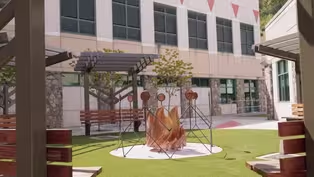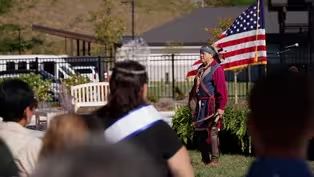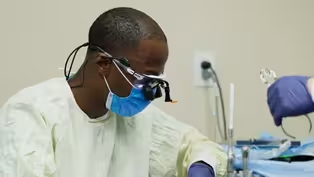
Why the Nursing Shortage Hasn’t Recovered From COVID
Clip: 2/14/2025 | 6m 37sVideo has Closed Captions
North Carolina's nursing shortage crisis drives search for innovative healthcare staffing solutions.
By 2030, North Carolina is expected to face a shortage of nearly 9,000 registered nurses, threatening every aspect of healthcare. Through innovative youth apprenticeship programs and statewide task forces, we explore cutting-edge solutions to revolutionize healthcare staffing. Explore these challenges and the promising innovations emerging to ensure quality care for generations to come.
Problems playing video? | Closed Captioning Feedback
Problems playing video? | Closed Captioning Feedback
ncIMPACT is a local public television program presented by PBS NC

Why the Nursing Shortage Hasn’t Recovered From COVID
Clip: 2/14/2025 | 6m 37sVideo has Closed Captions
By 2030, North Carolina is expected to face a shortage of nearly 9,000 registered nurses, threatening every aspect of healthcare. Through innovative youth apprenticeship programs and statewide task forces, we explore cutting-edge solutions to revolutionize healthcare staffing. Explore these challenges and the promising innovations emerging to ensure quality care for generations to come.
Problems playing video? | Closed Captioning Feedback
How to Watch ncIMPACT
ncIMPACT is available to stream on pbs.org and the free PBS App, available on iPhone, Apple TV, Android TV, Android smartphones, Amazon Fire TV, Amazon Fire Tablet, Roku, Samsung Smart TV, and Vizio.
Providing Support for PBS.org
Learn Moreabout PBS online sponsorship- North Carolina is facing a critical shortage of nurses.
By 2030, North Carolina faces an estimated shortage of nearly 9,000 registered nurses.
By then, 41 other states across the nation are projected to face similar nursing shortages.
And that's not just a number: it's misdiagnoses, delayed treatments, and lives at risk.
Imagine rushing to the ER here with chest pain only to experience a waiting room overflowing with patients and a skeleton crew of exhausted nurses.
And we are facing this shortage even before the pandemic.
Covid only made things worse.
So how did we get here?
What's working and what still needs to be done?
I'm David Hurst.
This is "ncIMPACT".
[laid-back jazz music] Welcome to the fast-paced life of registered nurse Carrie McKeaver.
- Good morning.
She manages six patients per shift ranging from pediatric to elderly care.
Some days her 12-hour shifts are so packed that she doesn't even have time to eat, but today she squeezed us into her busy schedule.
I know there's been a lot of talk just about the nursing shortage kind of across the nation.
Do you kind of see any of that on a day-to-day basis?
- Yeah, we do have some staffing issues sometimes.
- And how does that affect your day-to-day?
I mean, you seems pretty busy this morning.
- Yeah, yes, I mean, some days, 12 hours, it's like some days it just flies by because you're so busy.
Other days it's like, really, when you have a hard day it's like, "Gosh, this is really hard."
And you have to just remind yourself why you became a nurse in the first place and remind yourself that nobody wants to be in a hospital sick.
And everybody needs somebody to be able to take care of them and everything, so.
- [David] A lot of Carrie's hard days come when the hospital is short staffed, and the stakes are higher than just exhausted nurses.
You see, when we don't have enough healthcare workers, it becomes harder for people to get the care they need.
But how did we get here?
Well, it's not a simple answer, but it's definitely a perfect storm.
In North Carolina, a significant demographic shift is unfolding.
Like other states, our population is aging, and this is increasing the demand for healthcare.
And that same generation in the nursing workforce, they're approaching retirement age themselves.
But it's not just nurses retiring, it's also those who teach nurses, leaving a critical nursing educator shortage.
Oh, and before I forget, remember that whole North Carolina Medicaid expansion thing?
Well that means more people have access to healthcare, but it's also fueling an increased demand for services when the state is already shorthanded.
So where do we even begin?
Community leaders in Surry and Yadkin counties decided to begin in high school.
They've created one of North Carolina's first youth apprenticeship programs for nursing.
Here's how it works: High school students interested in healthcare can work as certified nursing assistants at local hospitals or long-term care facilities.
They complete their CNA certification while going through this pre-apprenticeship program.
These students may then enter a full apprenticeship, earning a free nursing degree at Surry Community College, all while continuing to get hands-on experience.
What is one of the benefits of providing high school students with this experience and exposure?
Do you feel like that helps them kind of get into the pathway?
- Definitely, 'cause sometimes it's hard to decide what you want to do when you grow up, and it is hard to know what you wanna do if you haven't seen it.
But then if they decide they do want to go into nursing or one of these healthcare fields, then we have this pathway that they can work here, they can get educational assistance, they can stay here, save mom and dad a lot of money, go right here to the community college, and work here while they go to school.
And then hopefully we'll keep them once they graduate.
- [David] After graduation, many apprentices are hired full-time by the facilities where they trained.
This approach addresses both workforce and instructor shortages by creating a direct path to nursing careers and prioritizing experienced students.
[students laugh] - [Teacher] Yeah, that looks.
- [David] But while North Carolina's four-year institutions have increased their output of bachelors nursing graduates since 2012, the community college system hasn't seen a comparable rise in associates nursing degrees.
Community college leaders point to their unique student body as a potential reason.
- A lot of times people think of college students as coming right outta high school and that is not the case at the community college.
In the community college system, we serve all students.
So we have 45-year-old mothers of five.
We have one of those in our program right now who works a full-time job and is in the RN program.
And so it's really challenging to be a student and have all of these other kinds of obligations that you have from your personal life, financial, and things like that.
- [David] So the community college offers students up to $10,000 in educational assistance.
The idea is that with this money, students can get help with anything they might need to finish the program such as transportation or childcare.
- So that way when life is getting too much and nursing school is getting too much, that they can get some help when they need it.
- [David] But while educating more nurses seems like an obvious solution, research tells us that a 10% increase in nursing graduates would only reduce the projected shortage by about 2,000 nurses, barely making a dent in the problem.
So what's the missing piece?
Well, it's retention.
The North Carolina Institute of Medicine recently led a task force to develop strategies for retaining nurses.
The task force identified four key areas for improving retention: enhancing career development, fostering a supportive workplace culture, expanding leadership opportunities, and more flexible work conditions.
Oh, and paying them a little more may help too.
When it comes to paying our nurses, North Carolina falls short.
Both licensed practical nurses and registered nurses in our state earn less than the national average.
But back in Surry and Yadkin counties, they're testing a theory: Can early investment in nursing careers lead to better long-term retention?
- And so I think the partnership has really helped dour students understand that they're investing in me, so I want to invest back in them.
- [David] One nurse Northern Regional Hospital hopes to keep around is Carrie McKeaver, a graduate of the nursing apprenticeship program.
For Carrie, the shifts may be long, but she says the work is deeply rewarding.
- I love being a bedside nurse.
It's challenging sometimes, but you get to see patients at the worst and get better and go home usually.
So for right now, I'm happy where I'm at.
- [David] Healthcare facilities will likely need to continue to come up with comprehensive strategies to attract and retain nurses like McKeaver.
These approaches could include partnerships with educational institutions or offering flexible programs and initiatives to improve job satisfaction and career growth.
For "ncIMPACT," I'm David Hurst.
How The Cherokee Are Disrupting Healthcare
Video has Closed Captions
Clip: 2/14/2025 | 7m 16s | Native American response to healthcare crisis offers lessons for better health outcomes nationwide. (7m 16s)
Video has Closed Captions
Preview: 2/14/2025 | 30s | In health care deserts, rural community members are pioneering new ways to care for their own. (30s)
Why Dentists Are Disappearing from Small Towns
Video has Closed Captions
Clip: 2/14/2025 | 8m 6s | The rural dental crisis inspires unlikely solutions. (8m 6s)
Providing Support for PBS.org
Learn Moreabout PBS online sponsorship
- News and Public Affairs

Top journalists deliver compelling original analysis of the hour's headlines.

- News and Public Affairs

FRONTLINE is investigative journalism that questions, explains and changes our world.












Support for PBS provided by:
ncIMPACT is a local public television program presented by PBS NC


